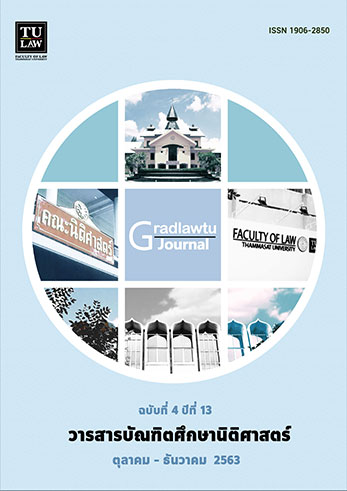ปัญหาการกำหนดคำบังคับให้เป็นไปตามคำวินิจฉัยของศาลรัฐธรรมนูญ
คำสำคัญ:
Problems, Order, Decision, Constitutional Courtบทคัดย่อ
บทคัดย่อ
บทความนี้มุ่งศึกษาปัญหาการกำหนดคำบังคับของศาลรัฐธรรมนูญไทยภายใต้บทบัญญัติแห่งรัฐธรรมนูญและบทบัญญัติแห่งกฎหมายที่เกี่ยวข้อง โดยศึกษาและวิเคราะห์เปรียบเทียบรูปแบบการกำหนดคำบังคับของต่างประเทศ เพื่อเสนอแนวทางการพัฒนาการกำหนดคำบังคับให้เป็นตามคำวินิจฉัยของศาลรัฐธรรมนูญไทย อันเป็นปัญหาสำคัญของกระบวนการยุติธรรมในทางรัฐธรรมนูญ และเนื่องจากเป็นการบัญญัติให้อำนาจแก่ศาลรัฐธรรมนูญเป็นครั้งแรกและศาลรัฐธรรมนูญได้กำหนดคำบังคับในคำวินิจฉัยที่ผ่านมาจำนวน 2 คดี คือ คําวินิจฉัยที่ 2 - 3/2563 และคําวินิจฉัยที่ 4/2563 จากสภาพปัญหาดังกล่าว บทความนี้ใช้วิธีการศึกษาข้อความคิดของการก่อตั้ง
ศาลรัฐธรรมนูญหน้าที่และอำนาจของศาลรัฐธรรมนูญ แนวคิดพื้นฐานของคำบังคับของศาลรัฐธรรมนูญ และการศึกษาเปรียบเทียบเพื่อพิจารณาว่าประเทศอื่นๆ เช่น สหพันธ์สาธารณรัฐเยอรมนี ได้กำหนดแนวทางของการกำหนดคำบังคับแบบเปิดกว้างให้สามารถกำหนดองค์กรหรือบุคลที่จะต้องปฏิบัติและวิธีการในการดำเนินการให้เป็นไปตามคำบังคับ แต่กรณีของสาธารณรัฐออสเตรียจะเป็นกรณีที่กำหนดแนวทางของการกำหนดคำบังคับอย่างแคบโดยกำหนดองค์กรหรือบุคคลที่จะดำเนินการตามคำบังคับไว้ อาทิ ศาลยุติธรรมหรือประธานาธิบดี อย่างไรก็ตามกรณีของสาธารณรัฐฝรั่งเศสได้อาศัยมาตรการอื่นทดแทนคำบังคับโดยรูปแบบของคำวินิจฉัยในลักษณะต่างๆภายใต้ข้อสงวนของการตีความ
ผลการวิเคราะห์พบว่า การกำหนดคำบังคับของศาลรัฐธรรมนูญไทยในคำวินิจฉัยทั้งสองคดียังมีปัญหาเกี่ยวกับประเภทของคดีที่ศาลรัฐธรรมนูญสามารถกำหนดคำบังคับได้ ทั้งในด้านของการกำหนดคำบังคับของคดีเกี่ยวกับความชอบด้วยรัฐธรรมนูญของกฎหมายหรือร่างกฎหมายและการกำหนดประเด็นแห่งคดีที่เป็นฐานในการกำหนดคำบังคับ ปัญหาเกี่ยวกับขอบเขตของการกำหนดคำบังคับ ทั้งในด้านการกำหนดให้ผู้ถูกร้องต้องดำเนินการหรือไม่ดำเนินการและในด้านการกำหนดเงื่อนไขหรือเงื่อนเวลา ซึ่งจากการศึกษาเปรียบเทียบเทียบกรณีศึกษาต่างประเทศ แม้ว่าศาลรัฐธรรมนูญไทยนำรูปแบบและแนวทางของกรณีของสหพันธ์สาธารณรัฐเยอรมนีมาปรับใช้ในปัจจุบันก็ตาม แต่บทความนี้เสนอให้ศาลรัฐธรรมนูญพิจารณานำรูปแบบของสาธารณรัฐออสเตรียมาปรับใช้ในกรณีที่ให้ศาลอื่นดำเนินการในกรณีที่มีกำหนดคำบังคับในลักษณะของการชดเชยเยียวยาค่าเสียหายหรือมอบให้ฝ่ายบริหารเป็นผู้ดำเนินการบังคับต่อองค์ของรัฐ หรือการนำรูปแบบของกรณีสาธารณรัฐฝรั่งเศสมาปรับใช้ในการตีความเพื่อสร้างดุลยภาพของอำนาจขององค์กรผู้ใช้อำนาจภายใต้ข้อสงวนการตีความของศาลรัฐธรรมนูญ
คำสำคัญ ปัญหา, คำบังคับ, คำวินิจฉัย, ศาลรัฐธรรมนูญ
เอกสารอ้างอิง
บรรเจิด สิงคะเนติ. ความรู้ทั่วไปเกี่ยวกับศาลรัฐธรรมนูญ. กรุงเทพมหานคร : สำนักพิมพ์วิญญูชน, 2560. บรรเจิด สิงคะเนติ, การคุ้มครองชั่วคราวและการบังคับให้เป็นไปตามคำวินิจฉัยของศาลรัฐธรรมนูญ, กรุงเทพมหานคร : สำนักงานศาลรัฐธรรมนูญ, 2548.
บรรเจิด สิงคะเนติ, รายงานการวิจัย เรื่อง การใช้สิทธิทางศาลของบุคคลซึ่งถูกละเมิดสิทธิหรือเสรีภาพ
ตามรัฐธรรมนูญมาตรา 28 ในกรณีที่ศาลมีคำพิพากษาถึงที่สุดแล้ว. กรุงเทพมหานคร : สำนักงานศาลรัฐธรรมนูญ, 2551.
วุฒิชัย จิตตานุ. กระบวนทางกฎหมายของศาลรัฐธรรมนูญในรัฐสมัยใหม่ของโลก. กรุงเทพมหานคร : สำนักงานศาลรัฐธรรมนูญ, 2555.
อุดม รัฐอมฤต, บรรเจิด สิงคะเนติ และเอกบุญ วงศ์สวัสดิ์กุล. รายงานการศึกษาวิจัยฉบับสมบูรณ์
เรื่อง สภาพบังคับของคำวินิจฉัยของศาลรัฐธรรมนูญ กรุงเทพมหานคร : สำนักงานศาลรัฐธรรมนูญ, 2549.
สรุปคำบรรยาย วิชา น.731 ปัญหากฎหมายมหาชน บรรยายโดย วรเจตน์ ภาคีรัตน์ บทที่ 2 ปัญหาเกี่ยวกับผลของคำวินิจฉัยของศาลรัฐธรรมนูญ.
ดาวน์โหลด
เผยแพร่แล้ว
ฉบับ
ประเภทบทความ
สัญญาอนุญาต
บทความหรือข้อความคิดเห็นใด ๆ ที่ปรากฏในวารสารบัณฑิตศึกษานิติศาสตร์เป็นความรับผิดชอบของผู้เขียนบทความโดยเฉพาะ คณะนิติศาสตร์ มหาวิทยาลัยธรรมศาสตร์ และกองบรรณาธิการไม่จำเป็นต้องเห็นด้วย



